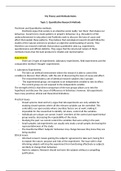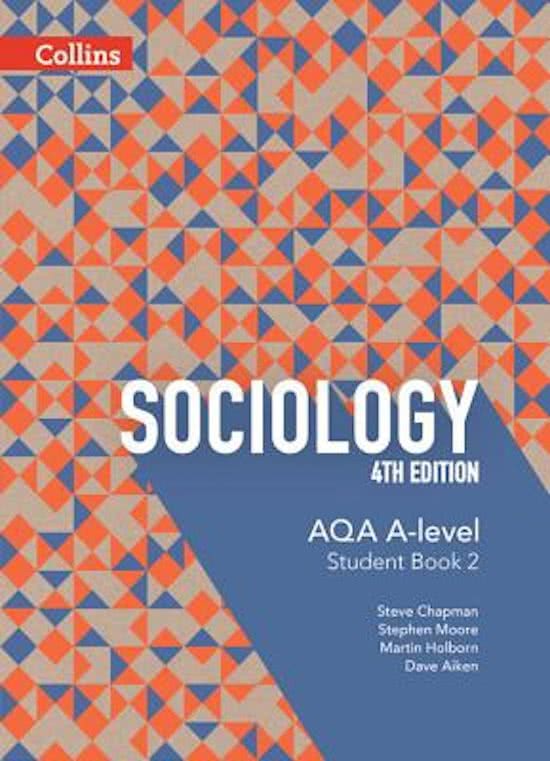My Theory and Methods Notes
Topic 1: Quantitative Research Methods
Positivism and Quantitative methods;
Positivists argue that society is an objective social reality ‘out there’ that shapes our
behaviour. Social forces create patterns in people’s behaviour (e.g. the pattern of WC
underachievement in education) and Positivists seek to discover the laws of cause-and-
effect that explain these patterns. They believe that sociological research should follow the
studies of the natural sciences to produce an objective understanding of society. They
therefore use research methods that produce quantitative data e.g. experiments,
questionnaires and official statistics. They argue that the structured nature of these
methods means that the date produced is reliable and representative.
Experiments:
There are 3 types of experiments: laboratory experiments, field experiments and the
comparative method (‘thought’ experiments).
1. Laboratory Experiments:
The lab is an artificial environment where the research is able to control the
variables to discover their effects, with the aim of discovering the laws of cause-and-effect.
The researched divides a set of identical research subjects into 2 groups:
- The experimental group: are exposed to an independent variable to test its effect
- The control group are not exposed to the independent variable.
The strength of this is that direct comparison of the two groups allows us to test the
hypothesis and discover the cause of differences in behaviour. However, lab experiments
have many practical, ethical and theoretical limitations.
Practical issues:
- Closed systems: Keat and Urry argue that lab experiments are only suitable for
studying closed systems where all the relevant variables can be controlled. This
contradicts our open society where countless factors are at work, making it
impossible for the researched to identify, let alone, control all the variables.
- Individuals are unique: we cannot ‘match’ members of the control and experimental
group exactly, decreasing the repeatability of the study.
- Studying the past: we cannot control the variables that were acting in the past.
- Small samples: lab experiments can usually only study a small sample, decreasing the
representativeness of the study.
- The Hawthorne Effect: Subjects’ behaviour may change because they know they are
being studied.
Ethical issues:
- Informed consent: means gaining the subjects’ agreement to take part, having first
to explain the nature, purpose and risks of the experiment. The issue with is that
informing subjects will stop the experiment from functioning effectively as subjects
are likely to change their behaviour.
- Harm to subjects: Research should not harm the subjects without a compelling
justification.
, - Treating subjects fairly: Where the experimental group are seen to be benefitting,
e.g. students gaining from a trial teaching method, this is unfair to the control group
who do not benefit from this.
Theoretical issues:
Positivists favour lab experiments due to their reliability as variables can be
controlled and replicated. However, even positivists recognise problems. Interpretivists
criticise lab experiments for lacking validity.
- Reliability and hypothesis testing: Reliability is important because replication allows
other sociologists to check the results of the original test. Positivists regard the lab
experiment as highly reliable because:
(-) The original researcher is able to define the exact steps taken, so others
can re-run it.
(-) It produces quantitative data, so the results can be compared with the
other repeated tests.
(-) It is detached and objective, the researcher simply changes the variables
and records the results.
- Representativeness: This is important to Positivists because they aim to make
generalisations about behaviour that can be applied to wider society. However,
findings may actually lack representativeness or external validity because:
(-) Small samples may mean findings cannot be generalised.
(-) Lack of representativeness as the more control of variables occurs, the less
like the real world the experiment becomes. This is the problem with
whether the findings of an experiments hold true for wider society. If not,
they cannot be generalised (external validity). Internal validity is if the
findings are true for the experimental subjects themselves, e.g. because of
the Hawthorne effect.
- Interpretivism and free will: Interpretivists claim humans are different from natural
phenomena because we have free will and choice. Our actions are based on
meanings and not caused by external forces. Meaning that they cannot be explained
through the cause-and-effect laws that experiments seek.
2. Field Experiments:
Sociologists sometimes used field experiments to overcome the lack of validity in lab
experiments. They differ from lab experiments in two ways; firstly, they take place in the
subject’s natural surroundings (e.g. classroom) limiting the amount of variables controlled to
increase validity and the subjects do not know they are in the experiment (limiting the
Hawthorne effect).
The researcher manipulates variables and see what effects they have. E.g. Rosenthal
and Jacobson manipulated teachers’ expectations by misleading them about pupil’s abilities.
This raises ethical doubts due to lack of consent and subject knowledge of the experiment.
Actor Tests and Correspondence Tests are field experiments. To test for
discrimination in employment, Brown and Gay sent a white and black actor for interviews
for the same posts. The actors were matched for age, qualifications, experience etc so any
difference in job offers could have only been due to discrimination.
3. Comparative (‘thought’) experiments:





